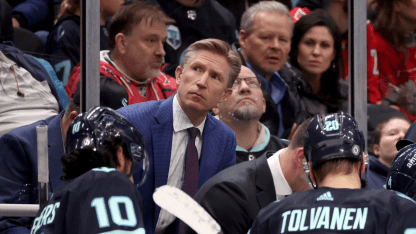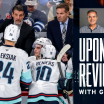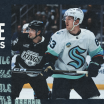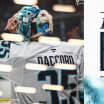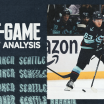This conversation occurred on Apr. 10, following the Apr. 9 win over Arizona
Dave, you’ve talked about the impact of the two-week stretch of play after the Mar. 12 overtime loss to Vegas when the team struggled to find wins. What are the challenges of managing a team through that timeframe?
You know, we came into (trade) deadline day with a ten-game record of 7-2-1, feeling very confident that we could make a push toward the playoffs. We hit a couple of stretches throughout the year and that was one of the stretches. So, we come to deadline day, we obviously lose ‘Wenny’ (Alex Wennberg) via trade and at the same time, we lost (Vince) Dunn and (Jaden) Schwartz during that stretch (due to injury). So those are things that, as a team pushing for the playoffs, you have to find ways to overcome them. You have to rise above them. In that case, we weren't able to do that. So, as we got two or three games later, you hit a mental block as you see the hill in front of you being awfully steep to climb. That's where we have to find a way to rejuvenate ourselves and continue to push forward, continue to find some positivity, and continue to stay in the fight as long as we possibly can.
There was a time there towards the end of that stretch, where, in your postgame comments (Mar. 24 vs. Montreal) you talked about playing for pride and for one another. Why was it important for you to share that after the game?
I wasn't trying to send a message. That's just the reality of it. You know, at that point, you're not mathematically eliminated from the playoffs, but when you look at the percentages, you have to find a different focus and a different purpose to make sure that you continue as a team doing positive things. And that is a really hard thing to do when you’re a team that has come into a year with the sole focus of being a playoff team, and all of a sudden, a new reality comes up, and it is stark and is sitting in front of you that you've come up short on that goal. Now you have to really dig deep to refocus your energy and find a different direction and pathway towards providing positive outcomes.
You've talked about this a couple of times, but again, just how impressive does this fan base continue to be? Not every team gets this kind of support.
You know, it's the second to last home game last night. We are mathematically eliminated from the playoffs. Yet the building is full, and the energy is high on a Tuesday night. So, I think that speaks to the volume and to the importance of our fans and our fan base to us. We had our ups and downs through that hockey game, but what I know from our players is that that game was important. We were ready to go at the drop of the puck. We built the three-goal lead. We sagged for 15 minutes in the hockey game, which nobody wants to do, but our goaltender stood tall and then, we reshaped our purpose in the third period and did a nice job closing out a hockey game in front of our fans.
You're at a point in the season where the organization is bringing in some young talent from Coachella to get some NHL experience. What are the challenges to you as a coaching staff of folding them in systematically and lineup-wise? How do you manage all that?
In this scenario, you have young players coming into the lineup that you want to empower and make sure have all the proper information and have confidence in the role that they're going to be given to go out and perform well for themselves individually, and more importantly, perform well for the team and help the team win. You also have individuals, veteran players, that are out of the lineup all of a sudden for ten days or two weeks in a row, and they're practicing only. So, there's a team dynamic there that leadership becomes very important as far as those veteran players handling things the right way. The young players are coming in with a great attitude and adding energy and feeling confident, and them being able to draw some of that from the veteran players in the dressing room is very important. That's kind of the complex side of it.
Now if we look at the simpler things, today we had 16 forwards in practice and six defensemen. Those are big numbers. In that scenario, you want to find a way to be creative and provide enough work and enough pace and enough touches for everybody so that they can feel good while still having a practice that provides some energy and some fun. We were able to do that on a day like today.
You mentioned managing players off the ice as the lineup changes. Every player on this team deserves to be in the NHL and wants to play, but sometimes they're not in the lineup because of the numbers. What do you have to do to manage that side of the game?
The best thing you can do is be honest and communicate, and sometimes that's more difficult than may meet the eye. But the best way is to just simply do that. Simply communicate the good and the bad, and that can alleviate some of the stress and a player's mind, whether it's a positive message or one that they probably weren't hoping to hear when you're in the lineup or out of the lineup. I do believe earlier communication helps alleviate that stress and that strain on the player. And beyond that, we want everybody to know that everybody's important in there.
Right now, the priority has been getting younger players in the lineup, and that is the spot that we are in. We are out of the playoffs. Right now, we have these young players come in and be able to experience the National Hockey League, get their feet wet, and gain some of that experience as to the things that they're going to need to improve on to have a chance to become full-time NHL players. These things are all very important parts of the process for us as we grow as an organization. Sometimes they're painful parts of the process, but they're all very valuable parts of the process.
With the younger players, what conversations are you having with (Firebirds head coach) Dan Byslma or (general manager) Ron Francis about managing these players in this specific moment?
We work with the young players on a daily basis here. Obviously, we know the players. We know the type of year that they've had, and we communicate with everybody involved, including our development staff led by Jeff Tambellini and his group, that do an outstanding job. So that's all part of the process of trying to put these players into spots where they have a chance to be successful and giving them that opportunity. As we’ve gone through that process, it's going on three weeks having some of these guys here, the players have done a tremendous job. They haven't been in the lineup the whole time, but while they're here, every day, every minute is part of the learning process. And we want them to make sure that they're taking that in and getting as much from that in terms of value developmentally. And then when the time does come for them to go back to Coachella and resume what's been a very successful regular season leading into the opportunity of a long playoff run, we want them to take those items and really apply them to themselves individually and to their game.
Earlier this season, you talked about focusing on defense when the team was struggling a little bit offensively. Are there other things about this team's identity or style that you've had to massage through the season or changes you've had to make thematically?
The biggest thing was, when we didn't get off to a good start offensively, that pushed us back a little bit and it took away some of our confidence. So, we had to find a way to rebuild that confidence through some of the defensive parts of our game. We've seen the ability to provide offense show itself a little bit sporadically here as we go down the stretch. But again, the foundation had to be solid defensively, generate offense from there.
We put ourselves into spots as you look through the year…our start was too slow. That made us chase the season the entire year. We were 1-4-1 out of the gates. That doesn't sound like much, but you're chasing. We were able to continually push back and by Thanksgiving, we got ourselves back above water, we got back to a .500 record. Then, we ran into a tough stretch. Now that pushes you back again. Similarly, coming out of the losing stretch as we went through the holiday season, we came out of that and went on a run of 11-0-2 where the identity was still solid defense, take care of the puck, generate offense in transition and generate off of the defensive side of the game. We were able to do that successfully.
The area that we want to make sure that we're able to grow in is being able to hold that foundation defensively, which is centered around good goaltending which we've had all year. But make sure that we can improve the things that we're doing offensively, whether that be personnel wise, schematics, or systems. We have to push the envelope to provide a little bit more offense off of that foundation that we have defensively.
The time for full reflection on the season will come once it is over, but is there anything else you'd like to share with our fans that I haven't already asked you about?
We're still in the fight. We've got a very important home game, and we have four to go on the road. And I think we’ll fully reflect on this year a couple of weeks down the road.
This transcript was lightly edited for brevity and clarity

